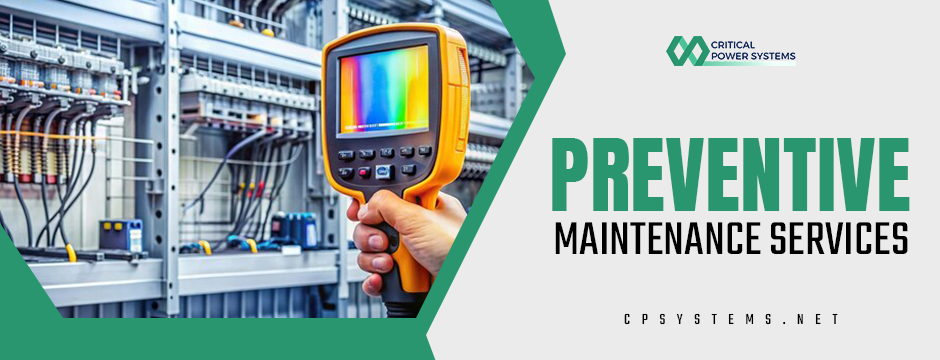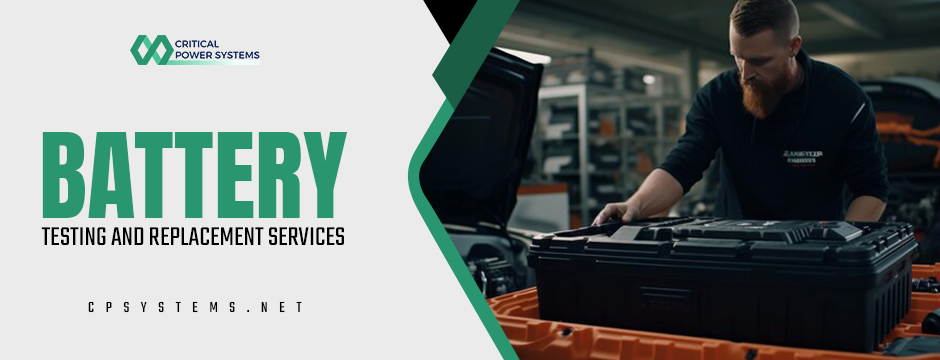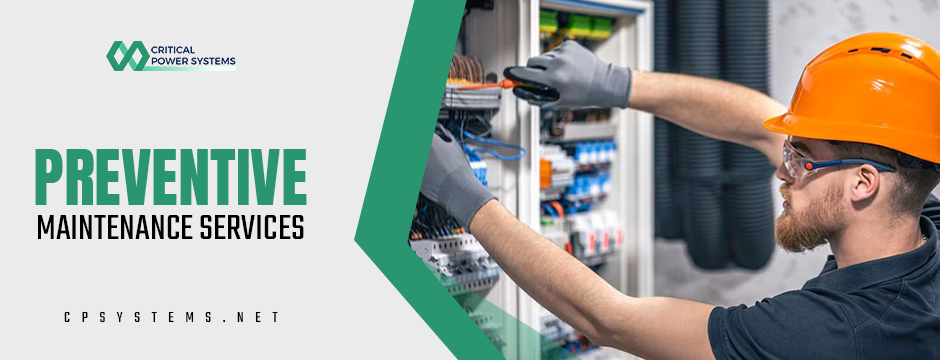In today’s fast-paced business landscape, uninterrupted operations are essential for maintaining productivity, meeting customer demands, and staying competitive. One of the most effective ways to ensure seamless business operations is through Preventive Maintenance Services. As we step into 2025, the need for proactive maintenance strategies has never been more critical. Businesses that prioritize preventive maintenance can significantly reduce downtime, enhance equipment lifespan, and improve overall operational efficiency.

What is Preventive Maintenance?
Preventive maintenance is a proactive approach to servicing and inspecting equipment at regular intervals to prevent potential failures before they occur. This strategy involves scheduled maintenance tasks such as battery testing and replacement services, lubrication, cleaning, part replacements, and performance testing. Unlike reactive maintenance, which addresses issues only after they arise, preventive maintenance focuses on preventing problems from happening in the first place.
Preventive maintenance can be categorized into time-based maintenance, usage-based maintenance, and predictive maintenance. Time-based maintenance involves performing maintenance tasks at fixed intervals regardless of equipment condition. Usage-based maintenance is performed based on equipment usage, such as after a specific number of operating hours. Predictive maintenance uses data and sensors to predict potential failures, offering the most efficient method to prevent breakdowns.
By incorporating all three types of preventive maintenance, businesses can create a comprehensive strategy that minimizes downtime and maximizes asset performance.
Importance of Preventive Maintenance for Business Continuity
1. Reducing Downtime and Increasing Productivity
Equipment breakdowns can bring business operations to a sudden halt, resulting in significant losses in productivity and revenue. According to industry reports, unplanned downtime costs businesses an average of $260,000 per hour. With Preventive Maintenance Services, businesses can identify and rectify minor issues before they escalate into major failures. Regular inspections and battery testing help ensure that essential systems like power backups, HVAC units, and electrical equipment are always in optimal working condition.
Preventive maintenance schedules should be aligned with business operations to minimize disruptions. For example, performing maintenance during off-peak hours or weekends can help maintain productivity while keeping systems running smoothly.
Additionally, implementing Computerized Maintenance Management Systems (CMMS) can automate scheduling and provide real-time updates on maintenance tasks, making the process more efficient and streamlined.
2. Extending Equipment Lifespan
Investing in high-quality machinery and equipment is a significant financial commitment for any business. Without proper maintenance, the lifespan of these assets can be drastically reduced. Preventive maintenance services, including battery testing and replacement services, ensure that equipment remains in peak condition, prolonging its operational life and maximizing return on investment.
For instance, regular cleaning of HVAC filters, lubrication of mechanical parts, and battery testing can prevent wear and tear, reducing the likelihood of unexpected breakdowns. By extending the lifespan of critical equipment, businesses can delay the need for costly replacements, saving both time and money.
3. Cost Savings on Repairs and Replacements
Reactive maintenance often results in emergency repairs, which can be both costly and time-consuming. Emergency repairs typically involve expedited shipping of replacement parts, overtime labor costs, and potential business disruptions. By adopting preventive maintenance, businesses can avoid unexpected breakdowns and minimize the need for expensive repairs or premature equipment replacements.
Routine battery testing and replacement services can prevent battery failures that could otherwise cause critical systems to shut down. Investing in preventive maintenance may seem like an added expense initially, but it ultimately results in substantial cost savings by reducing emergency repair costs and extending equipment lifespan.
4. Enhanced Safety and Compliance
Faulty equipment can pose serious safety hazards to employees and customers. Preventive maintenance services not only help in identifying potential risks but also ensure compliance with industry regulations and safety standards. Regular battery testing and electrical system inspections reduce the likelihood of accidents and ensure a safe working environment.
For industries such as healthcare, manufacturing, and data centers, adhering to safety standards is not just a regulatory requirement but a critical aspect of business continuity. Preventive maintenance programs help businesses meet Occupational Safety and Health Administration (OSHA) guidelines, National Fire Protection Association (NFPA) codes, and other regulatory requirements.
5. Improved Energy Efficiency
Poorly maintained equipment tends to consume more energy, leading to higher utility bills. Preventive maintenance helps optimize equipment performance, resulting in lower energy consumption and reduced operational costs. Regular servicing of HVAC systems, electrical panels, and power backups can significantly improve energy efficiency and contribute to sustainability goals.
For example, replacing worn-out batteries in UPS systems or cleaning condenser coils in HVAC units can improve energy efficiency by up to 20%. This not only reduces operational costs but also minimizes the business’s carbon footprint, aligning with corporate sustainability objectives.
Key Preventive Maintenance Services for Business Continuity
Battery Testing and Replacement Services
Batteries are critical components of backup power systems such as UPS units and emergency generators. Regular battery testing and replacement services are essential to ensure uninterrupted power supply during outages. Routine inspections can detect battery degradation early, allowing timely replacements and preventing unexpected power failures.
Battery testing involves measuring voltage levels, internal resistance, and capacity to assess the health of batteries. Advanced technologies such as impedance testing and load testing provide more accurate assessments, enabling businesses to proactively replace batteries before they fail.
HVAC System Maintenance
Heating, ventilation, and air conditioning systems play a vital role in maintaining a comfortable and productive work environment. Preventive maintenance for HVAC systems includes cleaning filters, inspecting ductwork, and checking refrigerant levels to ensure optimal performance and energy efficiency.
Regular HVAC maintenance not only improves energy efficiency but also enhances indoor air quality, contributing to a healthier work environment. Businesses should schedule quarterly inspections and filter replacements to maintain system performance.
Electrical System Inspections
Electrical panels, wiring, and circuit breakers must be regularly inspected to detect signs of wear and tear. Preventive electrical maintenance helps prevent short circuits, power surges, and fire hazards, ensuring continuous power supply and equipment safety.
Thermal imaging technology can be used during inspections to detect overheating components that may indicate potential failures. Regular inspections and tightening of electrical connections can prevent costly repairs and extend the lifespan of electrical systems.
Generator Maintenance
Backup generators provide emergency power during outages. Regular generator maintenance involves oil changes, fuel system checks, and load testing to ensure that the generator is always ready to operate when needed.
Load testing is especially crucial, as it verifies that the generator can handle its full rated capacity under simulated outage conditions. Businesses should schedule monthly operational checks and annual load tests to maintain generator reliability.
IT Infrastructure Maintenance
For businesses that rely on IT systems, preventive maintenance for servers, data storage devices, and networking equipment is crucial. Regular updates, security patches, and hardware inspections help prevent system failures and data loss.
Businesses should implement comprehensive IT maintenance plans that include data backups, virus protection, and hardware replacements to ensure seamless operations.

How Preventive Maintenance Supports Business Continuity Plans
A comprehensive business continuity plan outlines the steps a company must take to maintain operations during emergencies. Preventive maintenance services play a critical role in these plans by ensuring that essential equipment and systems remain functional at all times. Regular battery testing and replacement services, along with routine inspections of power systems, help businesses avoid costly disruptions and meet service level agreements.
Businesses should integrate preventive maintenance schedules into their business continuity plans, ensuring that critical systems receive regular attention. Collaboration between maintenance teams and business continuity planners is essential to align maintenance schedules with operational priorities.
Conclusion
In 2025, businesses cannot afford to overlook the importance of Preventive Maintenance Services. By adopting a proactive maintenance strategy, companies can reduce downtime, extend equipment lifespan, enhance safety, and optimize energy efficiency. Critical Power Systems offers comprehensive preventive maintenance solutions, including battery testing and replacement services, to help businesses achieve seamless operations and long-term business continuity.
Invest in preventive maintenance today and safeguard your business against unexpected disruptions.
FAQs
1. What is the difference between preventive maintenance and reactive maintenance?
Preventive maintenance involves regular inspections and servicing to prevent equipment failures, while reactive maintenance addresses issues only after they occur.
2. How often should businesses schedule preventive maintenance?
The frequency of preventive maintenance depends on the type of equipment and its usage. Critical systems like generators and HVAC units should be serviced quarterly or bi-annually.
3. Why is battery testing important in preventive maintenance?
Battery testing helps detect early signs of battery failure, ensuring uninterrupted power supply during outages and preventing costly downtime.
4. Can preventive maintenance improve energy efficiency?
Yes, regular maintenance improves equipment performance, reduces energy consumption, and lowers utility bills.
5. How can Critical Power Systems help with preventive maintenance?
Critical Power Systems offers comprehensive preventive maintenance services, including battery testing, HVAC servicing, and generator maintenance, to ensure uninterrupted business operations.

